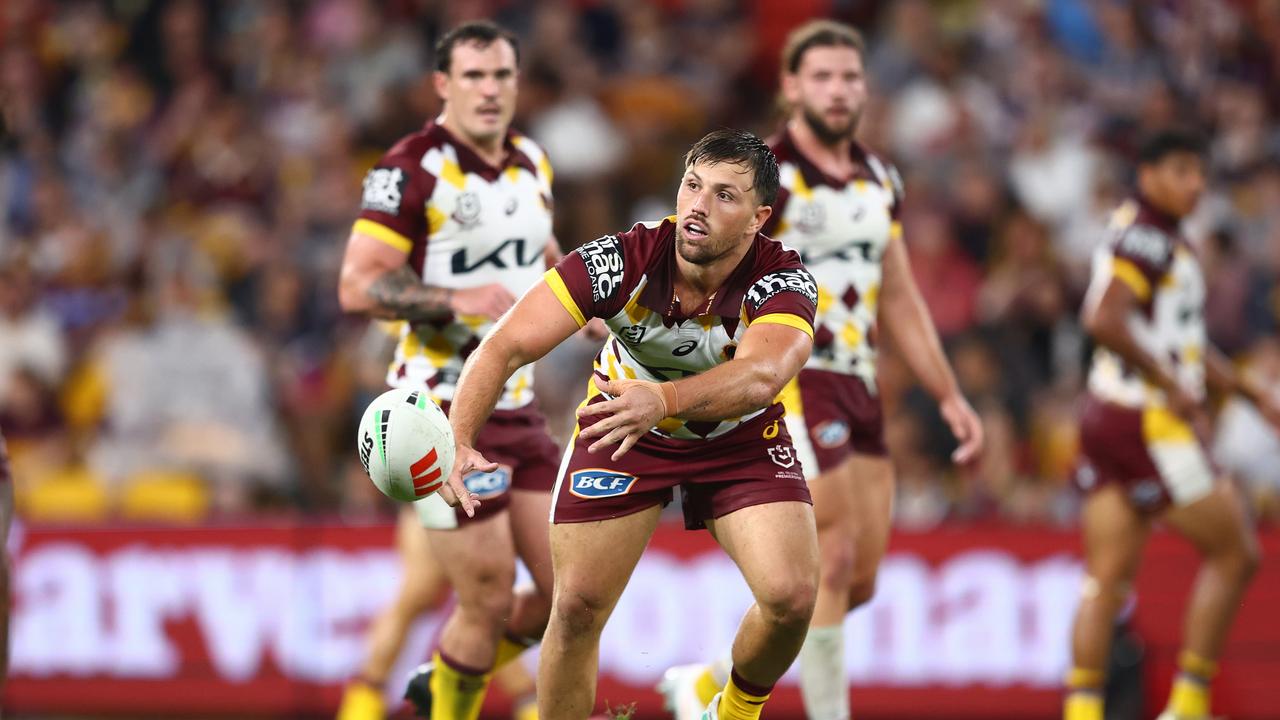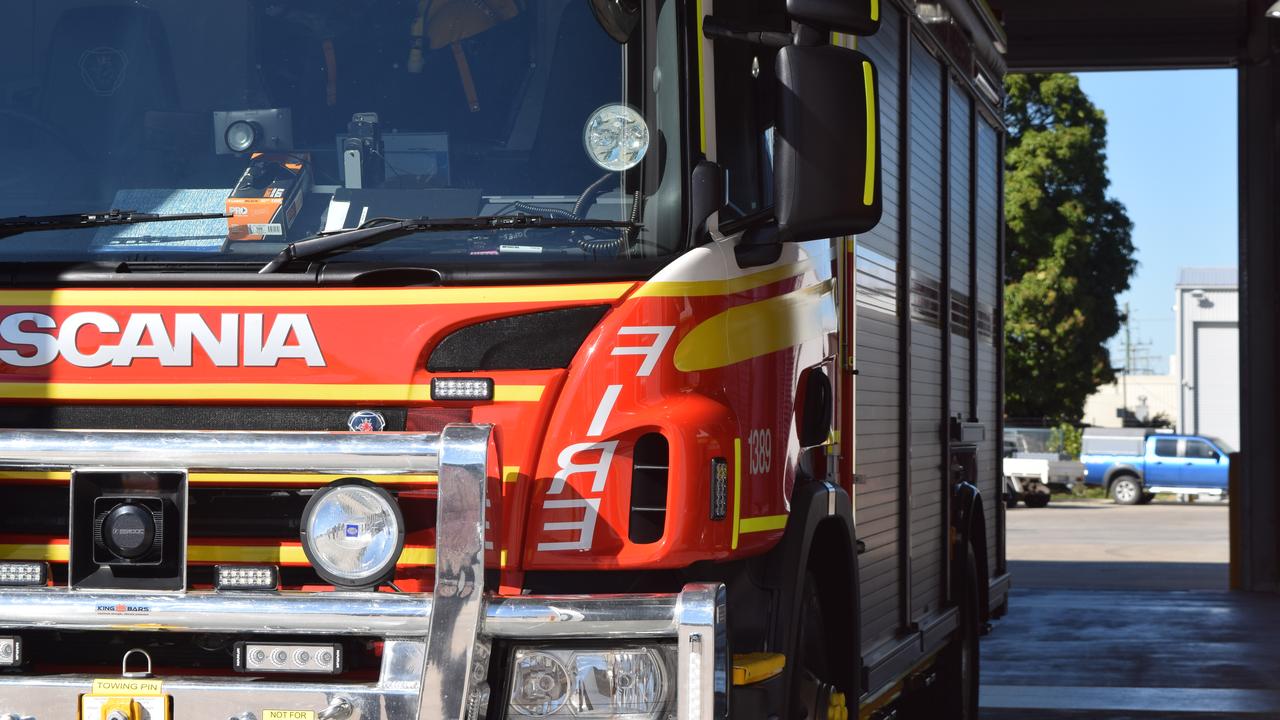Toowoomba residents reflect this World Refugee Week
Having to flee their homes as teenagers, and facing racism on Australian shores, two Yazidi youths have found mateship, loyalty and acceptance at a Toowoomba club. Their stories here.
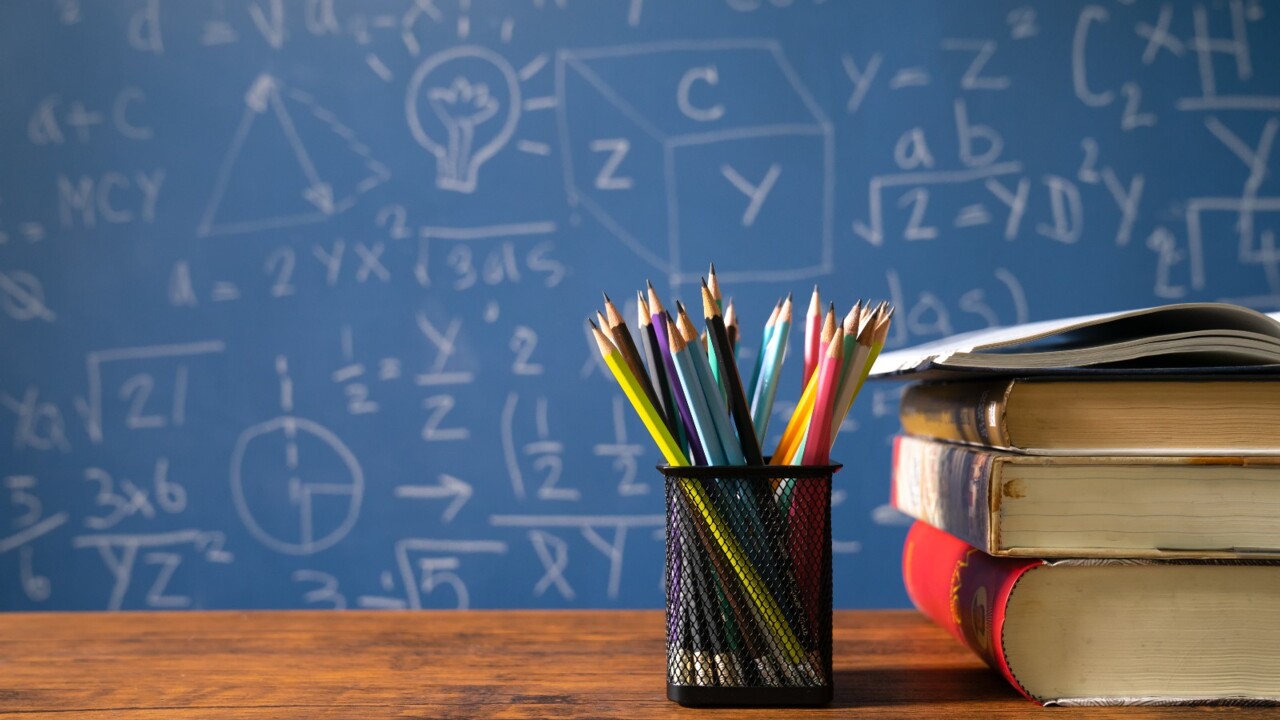
Toowoomba
Don't miss out on the headlines from Toowoomba. Followed categories will be added to My News.
Mateship, courage, endurance and sacrifice have solidified the Australian legend, and now, those values are helping new Australians settle into their new homes.
When Willowburn Football Club members Adnan Alharoni and Ilyas Alazeez moved to Toowoomba from Iraq in 2017 and 2018, their futures were uncertain.
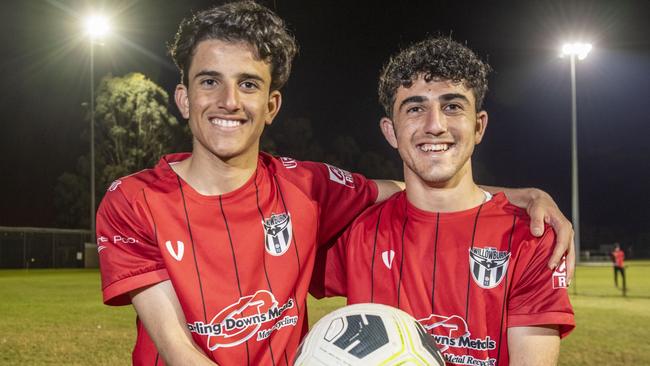
“It was scary … we didn’t like Australia and wanted to go back,” Ilyas said.
“I didn't know how to say ABC.
“We used to talk with hands, we didn’t have mouth, it was really hard.”
Adnan, 19, said while he was excited to see life in another country, leaving his country was hard.
“It wasn’t safe, even going out with friends isn’t safe … too many wars,” he said.
“But at the same time, I was a bit sad to leave my family there, my relatives, friends, country.”
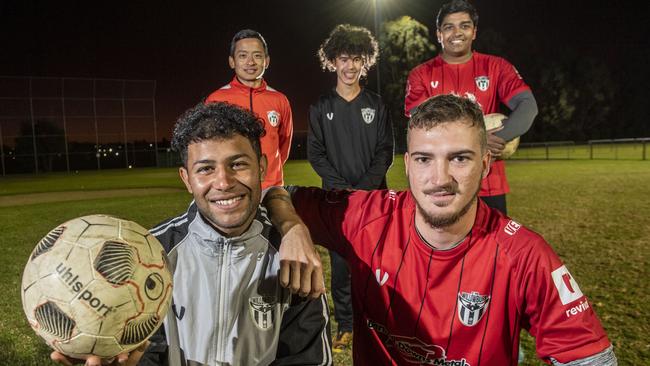
While football provided a fun past time, Adnan said the game at home had no equipment just the players.
“There were no good balls, no good fields,” he said.
“The goals were shoes or bags … I loved it.”
However, Adnan was ready to quit football after numerous heartbreaking experiences at two Toowoomba clubs.
“I remember the first time I played with a club in Toowoomba, I went for one or two sessions, they didn't even say hi to me,” he said.
“No one welcomed me … mostly all were making fun of my accent, cause I didn't speak English.
“Then I found Willowburn … they’re family now.”
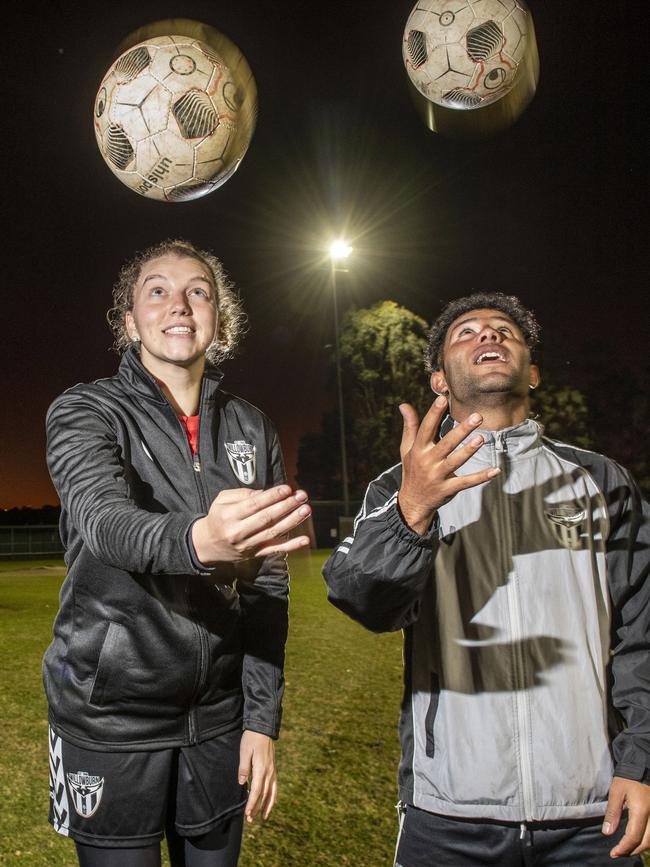
Adnan said the football club had provided him with a welcoming atmosphere to feel safe and supported while adjusting to his new life in Australia.
“At the beginning, I was a bit shy and for a few weeks, I didn't even come to training,” he said.
“I thought it would be like other clubs where no one would say hi to me.
“After I came here, for the first time, they all came to me, shake hands with me, they were so welcoming.
“I was going to quit football for the rest of my life … Willowburn is my life now.”
Ilyas, 16, played football in Iraq, and was relieved to feel he could be himself with his new team.
“I see my people … some are from different cultures … (but) I see them,” he said.
“I still have a piece of Iraq in my heart.”
Ilyas’s family previously lived on a farm in the city of Sinjar, when ISIS invaded the region in 2014.
“It was fun … we had goats, sheep, plants … but then the wars came,” he said.
“We had to walk far up to the mountains, then we had to go to a safe place, and from there we went to (refugee) camps.”
“The government then told us we’re going to Australia because we’ve had a bad life.”
Ilyas said he dreamt of finishing high school and one day becoming a teacher.
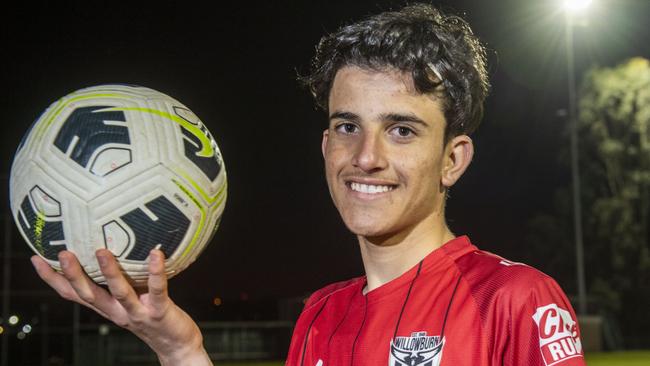
“I love mathematics, so I become a teacher hopefully and play football,” he said.
“On holidays when I get my passport, I will go to Iraq and see my old places.
“The houses are bombed over, so have to make new houses.
“Everyone is in Iraq, all my family … I only have one aunty here.”
Adnan had dreamt of supporting his family in any available capacity.
“I am in my last year of school, then maybe uni, maybe buy a house and maybe I will move to Brisbane or Newcastle,” he said.
“I don't have really a specific subject to work on, but I want to finish uni and get a good job.
“Maybe a teacher, or a doctor or something.
“Anything that will help me and my family.”
Pleas for Yazidi funding to continue
Refugee support services are pleading with the new federal government to boost their funding to help the thousands of Yazidi migrants currently in Toowoomba.
CatholicCare CEO Kate Venables has praised the Toowoomba Regional Council’s decision to write to new Home Affairs Minister Clare O’Neil to extend the Settlement Engagement and Transition Support (SETS) funding.
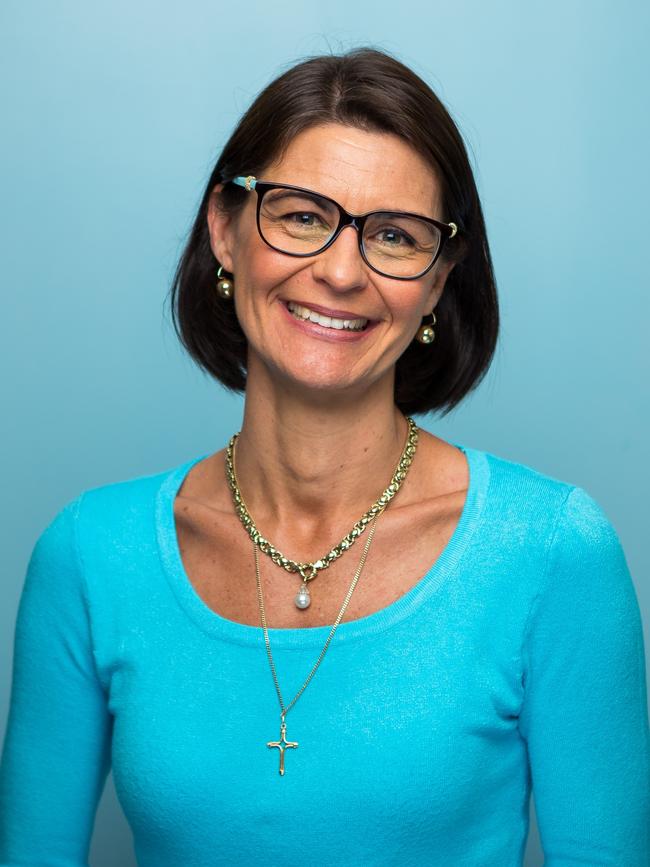
The motion, moved by Councillor James O’Shea at Thursday’s meeting, said the funding was essential to support the complex needs of the Yazidi people, who fled ISIS in Iraq and Syria five years ago.
“There have been significant learnings about the particular needs of the Yazidi community, including a better understanding of the complexity of the unique needs of this community since SETS funding arrangements were put in place in 2018,” Mr O’Shea’s motion read.
“An appropriate level of resourcing for the settlement sector will ensure that benefits can continue to be reaped from the strong collaborative partnerships and networks developed between SETS providers and the broader community across the region.”
Ms Venables said the organisation, which is responsible for helping refugees resettle along with Multicultural Australia, had been forced to support more new residents with less funding.
“We need more funding to do that, but it needs to recognise the principle of how Covid has impacted these people’s resettlements,” she sad.
“We’ve been encouraged by the Biloela family situation and we’re hopeful that a reasonable review of decisions regarding funding amounts will have a similar response.
“We get $280,000 a year, but what we do with that is extraordinary.
“In 2017-18, we got $340,000 — that was still tight, but we only had 500 people on our books and it’s now somewhere between 1500 and 2000.”
Ms Venables said CatholicCare wasn’t actually sure how many Yazidi people were based in Toowoomba, with several having migrated domestically to the region since 2017.
“We have about 800-1500 people on our books but the number of Yazidi is between 2500-3000 — we can’t be sure because we’ve got that internal migration,” she said.
New home, new mates in Rockville
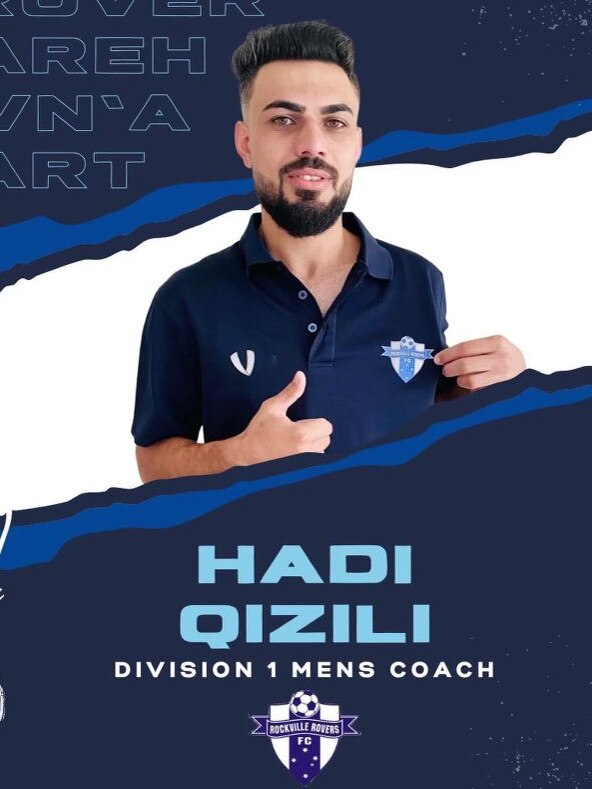
The 2014 invasion of ISIS into northern Iraq saw thousands killed and more displaced.
Hadi Qizili made the decision to flee the area with his wife and young daughter into nearby mountains, then Syria, and later a Kurdistan refugee camp.
“ISIS killed many of our country … we lost everything,” he said.
Mr Qizili’s family moved to Armidale, Australia in 2018, before arriving in Toowoomba in 2019.
“I had no words speaking English,” he said.
“I could not speak any English, only hello and goodbye. It was very hard and difficult.
“One day by one day we get better and better.”
In 2020, Mr Qizili found Rockville Rovers Football Club, where he said he instantly felt at home.
“They love refugees … they love us,” he said.
“They are respectful, and that's the reason I made my decision to come to Rockville and be a coach.
“Hopefully I will keep going until the end.
“A big thank you to Rockville for supporting us.”
Mr Qizili said the club helped himself and the community adjust to the new life.
‘Too many killings’: Daring escape for Syrian couple dreaming of family
Imagine working as hard as you can for a dream, to have it all blown apart and left in rubble.
Sadly, this is what many have faced across the world, and Maher Khoury is no exception.
Once owning his own business in Aleppo, Syria, Mr Khoury was left with ‘no option’ as he fled for his life.
“I against regime. It’s bad government … killed our people.
“I cannot live where the government don't control because there are Islamic groups.
“We love to stay in our city. We didn’t have an option. We had to leave.”
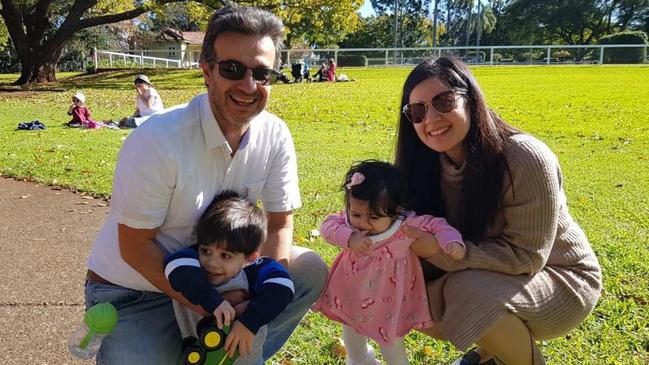
Mr Khoury fled with his future wife to North Iraq, before moving to Toowoomba in 2016, with dreams of starting a family.
“Middle East is crazy place to have children or family. It’s not safe,” he said.
“Everyone starts to fight another one. Anyone who feels he has enough power to kill another, he will kill another. We didn’t feel safe.”
Through the help of IVF, Mr Khoury and his wife welcomed their son George, and 18 months later, daughter Liana Grace.
The family now feel safe and welcomed in their home, Australia.
‘I am Australian’: Former Iraqi policeman finds safety in new life
Growing up, Hazm Khudedo always wanted to be a policeman in his home country of Iraq … but now, he can’t think back to those times.
From 2007 to 2019, Mr Khudedo worked part time as a police officer, a taxi driver and a mechanic.
But when Daesh, also know as Islamic State, invaded his country in 2014, his life dramatically changed.
“I wanted to be a policeman … I loved it … (then) big trouble,” he said.
“If you see, you can’t believe.”

Part of Mr Khudedo’s role was to attend horrific scenes, and document what he saw.
“You see in the TV or program community here … you see the pictures,” he said,
“When the Daesh come in, they say, ‘You are not Islam’ … cut your head off.
“Everybody, we say, we believe God, but we’re not Islam.”
Mr Khudedo said the Daesh would murder men to take their wives as prisoners.
“They take all the family, all the girls, they take it for them,” he said.
“They cut too many head of my community.
“Too many of my community was gone.
“The Daesh took them. One of them was my wife’s mum.”
After escaping into the mountains for two to three months, Mr Khudedo said he and his family were able to move to Australia in 2019.
“The mountain … it’s very difficult life there,” he said.
“No food, the water is very little.
“(My wife) went to the UN. She said, I don't want to live in Iraq … I want to go to Australia.
“The UN said okay.”

Mr Khudedo arrived in Toowoomba at the end of 2019 with his wife, two daughters and young son.
“They were very young … very, very small,” he said.
“(In Australia), everything’s easy. I love it.”
Mr Khudedo said he felt safe in the community, and considers himself a full Australian.
He does not allow himself to miss Iraq or the former life.
“Even though I was born there, even my dad there, my mum there, my brother there and my sisters … I can’t miss them.
“If I miss Iraq, I remember.
“Big trouble there … you don’t believe it.
“Too many of my community gone.
“Can’t think about it.”
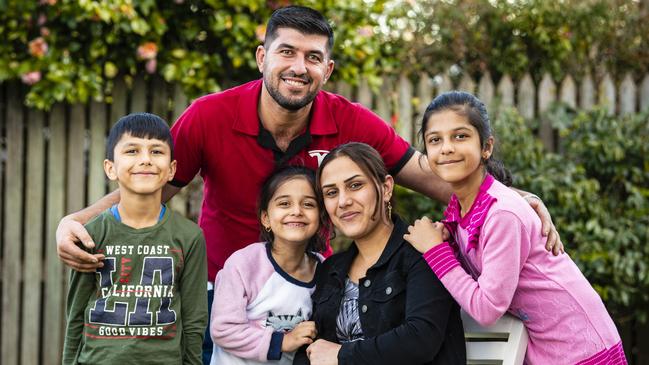
Since relocating to Australia, Mr Khudedo has gained official qualifications in mechanical work, and opened up his own shop, which he has since sold.
He is enrolled in TAFE where he is also learning English.
His children are enrolled in a local Toowoomba school, and he said he felt so lucky to live in Australia.
I’m more than a Syrian refugee
It may seem unimaginable to some, but for others, waking up to bombs falling over head was a reality for many in our community.
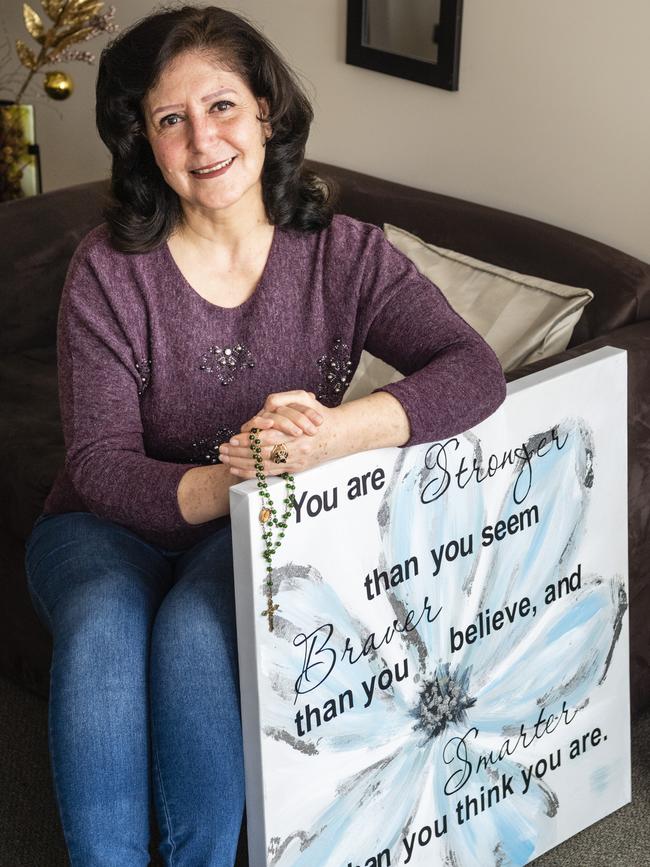
Josephine Mardini said her world changed in 2011 when war broke out in her beloved country of Syria, and she was left to run for her life.
“We are waking up to the sounds of bombshells and cannons falling on us, leaving behind huge numbers of martyrs, wounded and injured,” she said.
“Which led to the displacement of many people from Syria, and I am one of them.
“We never thought to abandon our homeland, but the suffering we were facing forced us to leave.”
Ms Mardini recalled the moment Isis invaded her hometown of Damascus in the middle of the night, leaving her with a tough decision that could mean the difference between life and death.
“The soldiers and army asked us to move … but I cant,” she said.
“My mum and dad … my mum was sick in the bed and my dad was an old man. They cant walk quickly … run … and there’s no light. No electricity. So it was hard. I decided not to leave.”
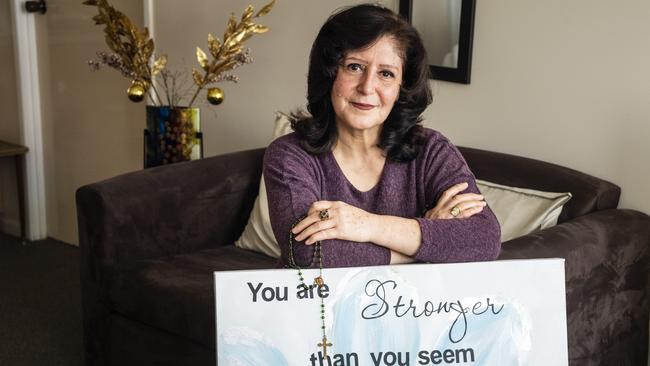
Ms Mardini said the guards rescued her family, but the nightmare would last another six years, and involve the loss of friends and family.
“It was a nightmare, during the day and during the night. You don't know when the bomb comes,” she said.
After the death of her parents, Ms Mardini decided it was time to leave, and lived in Lebanon with her brother, before moving to Australia in 2019.
“It was very harsh that day when I left my home in Damascus,” she said.
“It was even tougher when I looked back to bid farewell to the flag of my country, which was waving in sorrow for the loss of its children.
“I do not know when I will return to see it again. It's heartbreaking.”
Trained as a civil engineer and knowledgeable in English, Ms Mardini said Australia presented new opportunities, yet she is still classed as a refugee.
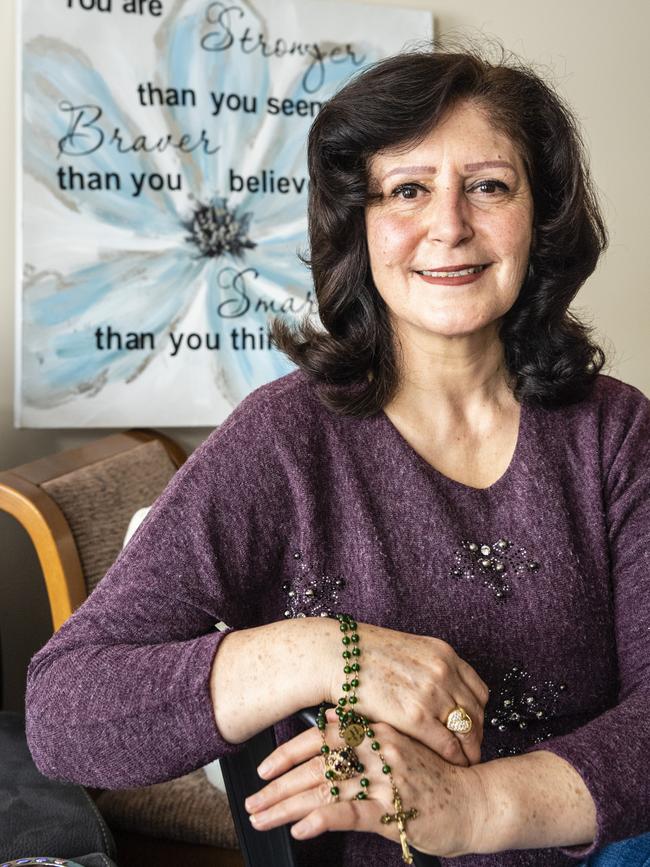
“We lived in Syria in safety and peace, and our lives were beautiful and full of joy,” she said.
“When I arrived in Australia three years ago, it was difficult to distinguish my feelings because it was mixed with joy and sadness.
“I am happy because I am in a country so far from war, in which I felt peace and security, and this is a great gift from God and from Australia.
“I was sad because my name changed from a Syrian citizen who lost everything she owned and came here with empty hands to get a new name “Refugee.” Yes, it is a very painful feeling.
Ms Mardini said her feelings soon changed when she realised the values, principals, experiences and culture she held and was able to use in her new home.
She quickly became involved with St Vincent de Paul Society as a volunteer, gained certification in interpretation and started work at the Toowoomba Hospital, became a member of City Women/Sisters and of choir Women in Harmony.
“My ambition did not stop here. I am still searching and seeking to work and practice my experience as an engineer in the oil and gas field,” Ms Mardini said.
“Allow me to admit to you something real that the Australians in Toowoomba are kind, generous and giving.
“They are always smiling at me and remarkably welcoming of my friendship and trying to make me feel accepted as a member of the Australian community.”
Ms Mardini’s letter to the public
كنا نعيش بسوريا بأمان وسلام وكانت حياتنا جميلة مملوءة فرح
لم نجوع يوما” ولم نتعود أن نستعطي. الشعب السوري لديه اعتزاز بنفسه ويحب الثقافة والتعلم من أجل ذلك تجد معظم الشباب لديهم شهادات جامعية. كان لدينا الاكتفاء الذاتي في سوريا لأن اقتصاد سوريا قبل عام 2010 كان من أكثر اقتصاديات الدول النامية تنوعاً، فإن سوريا كانت تنتج 75 % من أغذيتها وأدويتها وألبستها وأحذيتها وتصدّر الفائض هذا يدل على أن الشعب السوري متعلم ويحب العمل
وأنا جوزفين واحدة من السوريين التي تلقيت العلم بسوريا وذهبت الى انكلترا لأتعلم اللغة الإنكليزية ومن ثم عدت الى وطني لأعمل فيه وقد سمح لي القدر بأن أعمل بشركة نفط وغاز دولية كان لديها مكتب بدمشق
ولكن وللأسف بعام ١٩١١ تم تحول مريع بحياة الشعب السوري.
أصبحنا نستيقظ على أصوات القذائف والمدافع التي تسقط علينا وتخلف ورائها أعداد هائلة من الشهداء والجرحى والمصابين. مما أدى الى نزوح الكثيرين من سوريا وأنا واحدة منهم
لم نفكر يوما” أن نهجر وطننا ولكن المعاناة التي كنا نواجهها جبرتنا على الرحيل
كان قاسيا” جدا” ذلك اليوم الذي تركت به بيتي في دمشق بل كان أقسى عندما نظرت الى الوراء لأودع علم بلدي الذي كان يرفرف حزنا لفقدان أبناءه لا أدري متى سأعود لأراه ثانية
عندما وصلت الى أستراليا من ثلاث سنوات كان من الصعب أن أميز شعوري لأنه كان ممزوجا” فرحا” وحزنا””.
فرحا” لأنني ببلد بعيد جدا” عن الحرب، فيه شعرت بالسلام والأمان بفضل الله وأستراليا
وحزنا” لأنه تغير اسمي من مواطنة سورية خسرت كل شيء تملكه وجاءت هنا بأيادي فارغة لتحصل على اسم جديد “ لاجئة”. نعم إنه شعور مؤلم للغاية.
ولكن سرعان ما تبدل هذا الشعور عندما بدأت التفكير يأني جئت مصطحبة قيم ومبادئ وخبرات وثقافة وعزمت على استعمالها في وطني الجديد استراليا.
-بعد وصولي الى استراليا بشهرين فقط حصلت على عمل تطوعي في جمعية سان فنسنت دو بول مما أعطاني فرصة لأساعد اللاجئين في توومبا
- حصلت على شهادة الترجمة الفورية وبدأت أعمل بمشفى توومبا
-أصبحت عضوة في سيدات المدينة/ الأخوات لمساعدة السيدات اللاجئات بالتعرف على سيدات أستراليات لبناء علاقة صداقة فيما بينهم ويشعرون بالطمأنينة.
-أصبحت عضوا” بجوقة سيدات في تناغم نغني في مناسبات عديدة
طموحي لم يتوقف هنا ما زلت أبحث وأسعى لأعمل وأمارس خبرتي كمهندسة في مجال النفط والغاز
.
أسمحوا لي أن أعترف لكم بشيء حقيقي بأن الأستراليين في توومبا لطيفين وكرماء ومعطاءين. انهم دائما” يبتسمون لي ويرحبون بصداقتي بشكل ملحوظ ويحاولون أن يشعروني بأنني مقبولة كفرد بالمجتمع الأسترالي
The Chronicle apologises if there are translation problems within Ms Mardini’s words.
From war-torn Sudan to Toowoomba to uni researcher
Imagine having to give birth in complete silence to avoid being heard by roaming gunmen.
This was a devastating reality during the birth of Nyakuoy Yak, who started her life on the run from armed soldiers in Sudan.
“There were men fighting all around and how (my mum) managed to give birth without giving away her location I’ll never understand,” Ms Yak said.
This week is World Refugee Week, and in 2005, Ms Yak and her family began a new life in Toowoomba, after escaping a war-torn Sudan and living in a Kenyan refugee camp.
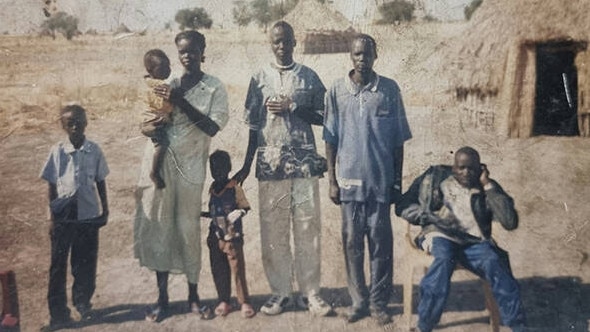
Ms Yak said her family were rescued by a helicopter shortly after her birth, and her mother was determined to provide a better life for her children.
After applying three times for refugee status in Australia, Ms Yak’s family, including her older brother and two younger sisters were granted visas in 2005.
“We struggled a lot,” Ms Yak said.
“We had a really hard time with things people don’t realise you have to adjust to.
“The first time we went grocery shopping, we had no idea how to get anything – Mum just followed a woman around and picked up everything she picked up.
“Sometimes our lunches were a cucumber and can of beetroot.”
Happy #RefugeeWeek2022
— FECCA (@iFECCA) June 19, 2022
To all who've come to Australia for safety and a new life, we say welcome.
You belong, you make us richer, and you're the future.
Check out refugee week events here: https://t.co/vAd81HGXrfpic.twitter.com/mouuuyMRlo
Ms Yak said it took the family two years to learn how to change television channels, while they were still learning English.
“The social housing we moved into came with a TV – but we’d never seen one before,” she said.
“We were watching shows like The Simpsons and NCIS without a clue of what was going on!”
At eight years old, Ms Yak was enrolled in a Toowoomba primary school, and with the support of the growing Sudanese community and local church members, she was able to thrive in high school.
Seeking asylum is a human right. It's non-negotiable. #WorldRefugeeDaypic.twitter.com/s6Su4lEV8y
— UNHCR, the UN Refugee Agency (@Refugees) June 19, 2022
Now, Ms Yak is completing her PhD in super resolution microscopy with the University of Queensland and works in the microscopy team at the Queensland Brain Institute.
Ms Yak has been named a 2022 Westpac Future Leaders Scholar, which will allow her to travel overseas to visit leading research institutes.
Despite moving to Australia knowing one language, Ms Yak is now fluent in five languages and hopes to learn more.
“This is a time for me to look back on my own journey but also celebrate the resilience of past, present and future refugees as they flee their homes in the hopes of a better future.”
More Coverage
Originally published as Toowoomba residents reflect this World Refugee Week



